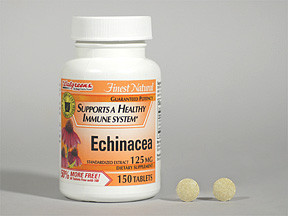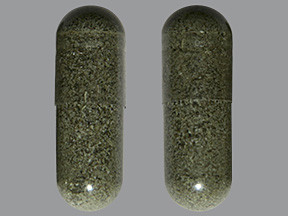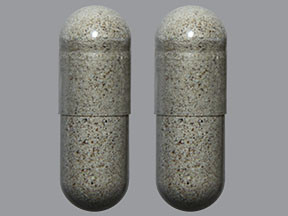ECHINACEA (Echinacea sp.) - ORAL
PHONETIC PRONUNCIATION:
GENERIC NAME(S): Echinacea
Uses
USES: Echinacea has been used for virus infections such as the common cold and flu. It is used to strengthen the immune system. It has also been used for returning vaginal fungal infections ("yeast infections") along with antifungal products applied to the vaginal area. Some herbal/diet supplement products have been found to contain possibly harmful impurities/additives. Check with your pharmacist for more details about the brand you use. The FDA has not reviewed this product for safety or effectiveness. Consult your doctor or pharmacist for more details.
How to use ECHINACEA (Echinacea sp.) - ORAL
HOW TO USE: Take this product by mouth as directed. Follow all directions on the product package. If you are uncertain about any of the information, consult your doctor or pharmacist. Prolonged use may lessen the effects of this product. It is recommended that this product be used for no more than 8 weeks at a time. If your condition persists or worsens, or if you think you may have a serious medical problem, seek immediate medical attention.
Side Effects
Precautions
Interactions
Overdose
Images
Reviews
Faq for ECHINACEA (Echinacea sp.) - ORAL
Echinacea is a group of flowering plants in the daisy family, native to North America. They are also known as purple coneflowers.
Echinacea is commonly used as a dietary supplement to boost the immune system and prevent or treat the common cold, flu, and respiratory infections. It is also believed to have anti-inflammatory properties.
Echinacea is typically taken orally in the form of capsules, tablets, liquid extracts, or teas.
Some people may experience allergic reactions to echinacea, such as rash, itching, or swelling. Additionally, long-term use or high doses of echinacea may suppress the immune system.
While echinacea may help alleviate symptoms and shorten the duration of the common cold or flu, it is not a cure. It is more effective when taken at the first sign of illness.
Echinacea may interact with certain medications, including immunosuppressants, antiviral drugs, and medications metabolized by the liver. It is important to consult a healthcare professional before taking echinacea if you are on any medication.
The duration of echinacea supplementation varies depending on the purpose. For preventing colds or flu, it is recommended to take echinacea for 1-2 weeks at the onset of symptoms. However, long-term use should be avoided.
Echinacea is generally considered safe for children, but it is important to use child-specific formulations and consult a pediatrician before giving it to children.
Pregnant or breastfeeding women should consult a healthcare professional before taking echinacea, as the safety and effectiveness during these periods are not well-established.
Disclaimer
IMPORTANT: HOW TO USE THIS INFORMATION: This is a summary and does NOT have all possible information about this product. This information does not assure that this product is safe, effective, or appropriate for you. This information is not individual medical advice and does not substitute for the advice of your health care professional. Always ask your health care professional for complete information about this product and your specific health needs.




No Reviews Yet